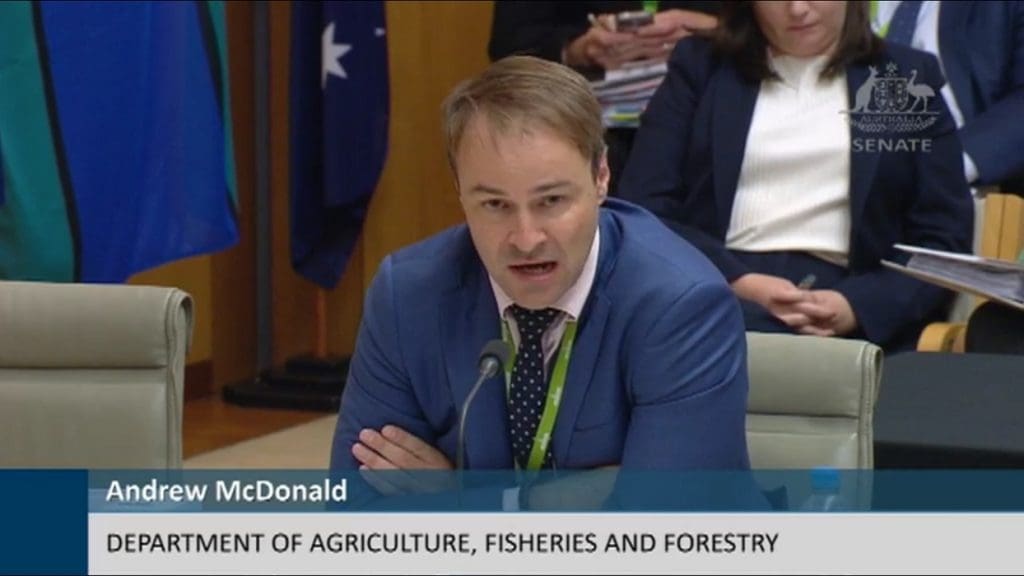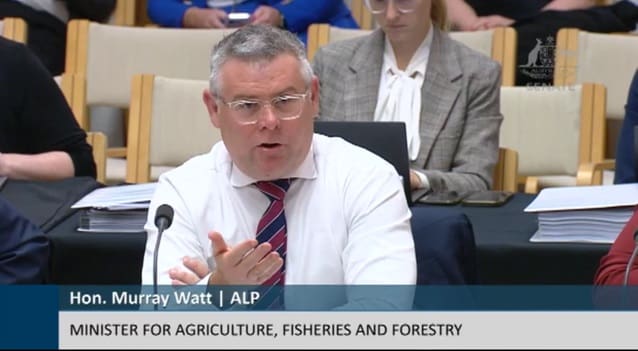
DAFF live export decision maker Andrew McDonald.
BELEAGURED Israeli-owned live export vessel the MV Bahijah focused senators on a number of trade issues at a Senate Estimates hearing yesterday.
As the vessel unloaded its 14,000 sheep and 1500 cattle at Fremantle in Western Australia, senators on the Rural Regional Affairs and Transport Legislation Committee grilled Minister for Agriculture Fisheries and Forestry Murray Watt and his department team on live export issues.
These included the status of a review of the regulator’s independent observer policy, the lack of an upper limit on live export voyage duration and the unlikelihood of a prohibition by Minister for Agriculture Fisheries and Forestry Murray Watt on live export vessels entering into conflict zones.
DAFF first assistant secretary – traceability, plant and live animal exports – and live export decision maker, Andrew McDonald, said the MV Javan is currently transiting the Red Sea but its contingency circumstances make its situation different to the MV Bahijah that was ordered back to Australia on 19 January this year.
At Estimates, Mr McDonald agreed with Greens Senator Mehreen Faruqi that in explaining his reasons for ordering the MV Bahijah back to Australia, the department had never approved a voyage of more than 60 days and that if he had approved a re-export application for the MV Bahijah to Israel via the South African coast last month the total voyage time would have exceeded 65 days and possibly 70 days.
“We don’t have a maximum Senator, what we classify as an extended long-haul voyage is 31 days or greater under the Australian Standard for the Export of Livestock …. and requires additional assurances from us around the health and welfare of the livestock on board.
“The previous longest journey was back in 2018 and that was 51 days,” he said.
Senator Faruqi asked if DAFF had considered what was “too long” for a voyage and Mr McDonald said he appreciated the sentiment.
‘We probably haven’t gone to an upper limit or a threshold in that regard because it is such a rare event, it is something we would have to reflect on after this.”
Mr Fennessy said the department took a strict approach under the legislation and evaluated voyages on a consignment-by-consignment basis.
No prohibition on vessels entering conflict zones

Minister for Agriculture Fisheries and Forestry Murray Watt at Senate Estimates yesterday: not considering any prohibition on vessels entering conflict zones.
Although the MV Bahijah was recalled from going through the Red Sea due to Houthi rebel activity in the area and another vessel (MV Jawan) with approved contingency plans was recently allowed to use that route to Jordan, Mr Watt told Senator Faruqi he was not considering a prohibition on vessels entering conflict zones.
“No I’m not, because for starters it would be an extremely serious move for a minister to provide that kind of direction, noting that the regulation of live animal exports is done independently by an official within the department
“And from everything I have seen and heard I have confidence in the regulator’s ability to make judgement on a case-by-case basis, including considering contingency plans that are put forward.”
Independent observer policy still under revision
Mr McDonald said there were no independent observers on the MV Bahijah or the MV Jawan because they are employees under his responsibility.
“And under the Commonwealth Work Health and Safety Act I made a decision last year to suspend the deployment of independent observers to the voyages going to the Red Sea.”
On 9 October 2023, the department temporarily paused the deployment of observers on voyages carrying Australian livestock to all ports in the Middle East region due to uncertain security conditions, recommencing their deployment on voyages to ports in the Gulf of Oman and Persian Gulf on 22 November 2023. The DAFF website says that deployments of observers on livestock voyages travelling to/through the Red Sea or to any ports in Israel remain paused due to the changing and uncertain security conditions.
Senator Faruqi said IOs were critical to holding exporters to account on animal welfare and DAFF data shows that the proportion of vessels with observers has lowered to about 50pc of eligible voyages in 2019 and to 12pc in 2023.
Mr McDonald said the department was still revising its IO policy and had not been “ventilated” through consultation processes nor “necessary engagement with the minister.”
“The honest answer is it is something that we wish to proceed with, but we need to manage our competing priorities at any given time and there has been a lot of competing priorities in recent times.
“It would require us to change our focus at this time senator,” he said.
She said the independent observers were put on vessels for animal welfare of the livestock, but Mr Fennessy said the observers do not play an active role in the daily management of livestock but collect information.
Mr McDonald said the department has suggested that the recently appointed interim Inspector General of Animal Welfare and Live Animals Exports have a look at independent observers as a departmental policy.
“And he has made a decision that it is one of the things that he does want to examine this calendar year.”
No estimate on DAFF costs involving MV Bahijah
Mr McDonald was unable to give an estimate of the DAFF staff and resource cost of dealing with the MV Bahijah situation was costing the department, but would not be recovering any of these costs from the live export industry.
“The cost recovery impact statements don’t provide the precise charging mechanisms that would allow us to recover the full gamut of costs related to this.
“Some charging could be considered but that’s still before us and still to be evaluated,” he told Greens Senator Mehreen Faruqi.
Mr McDonald took it on notice to provide the current accumulated costs department is facing for live export regulatory services not covered under the department’s cost recovery scheme.

Absolutely disgraceful, how can DAFF and the Australian government be so impotent and lacking in moral fibre? They:
-Can’t prohibit live export vessels from entering conflict zones;
-Can’t send independent observers on live export ships that may enter conflict zones because of the security risk, but are happy to approve animals and foreign crews to enter these conflict zones;
-Can’t recover the huge resource and DAFF staff costs from the live export industry – that were incurred dealing with the MV Bahijah fiasco, and
-Can’t meet community expectations to legislate a date to end to this activity that the public has never approved of.
No wonder so many Australians have no faith in our government and its departments.